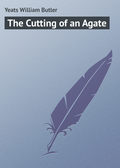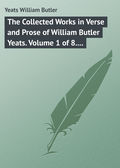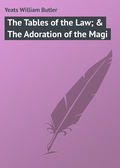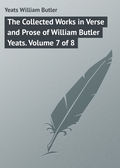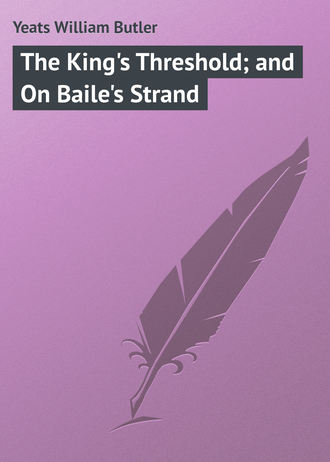
William Butler Yeats
The King's Threshold; and On Baile's Strand
ON BAILE’S STRAND
Cuchullain, the King of Muirthemne.
Concobar, the High King of Ullad.
Daire, a King.
Fintain, a blind man.
Barach, a fool.
A Young Man.
Young Kings and Old Kings.
Scene: A great hall by the sea close to Dundalgan. There are two great chairs on either side of the hall, each raised a little from the ground, and on the back of the one chair is carved and painted a woman with a fish’s tail, and on the back of the other a hound. There are smaller chairs and benches raised in tiers round the walls. There is a great ale vat at one side near a small door, and a large door at the back through which one can see the sea. Barach, a tall thin man with long ragged hair, dressed in skins, comes in at the side door. He is leading Fintain, a fat blind man, who is somewhat older.
Barach.
I will shut the door, for this wind out of the sea gets into my bones, and if I leave but an inch for the wind there is one like a flake of sea-frost that might come into the house.
Fintain.
What is his name, fool?
Barach.
It’s a woman from among the Riders of the Sidhe. It’s Boann herself from the river. She has left the Dagda’s bed, and gone through the salt of the sea and up here to the strand of Baile, and all for love of me. Let her keep her husband’s bed, for she’ll have none of me. Nobody knows how lecherous these goddesses are. I see her in every kind of shape but oftener than not she’s in the wind and cries “give a kiss and put your arms about me.” But no, she’ll have no more of me. Yesterday when I put out my lips to kiss her, there was nothing there but the wind. She’s bad, Fintain. O, she’s bad. I had better shut the big door too.
[He is going towards the big door but turns hearing Fintain’s voice.
Fintain.
[Who has been feeling about with his stick.] What’s this and this?
Barach.
They are chairs.
Fintain.
And this?
Barach.
Why, that’s a bench.
Fintain.
And this?
Barach.
A big chair.
Fintain.
[Feeling the back of the chair.] There is a sea-woman carved upon it.
Barach.
And there is another big chair on the other side of the hall.
Fintain.
Lead me to it. [He mutters while the fool is leading him.] That is what the High King Concobar has on his shield. The High King will be coming. They have brought out his chair. [He begins feeling the back of the other chair.] And there is a dog’s head on this. They have brought out our master’s chair. Now I know what the horse-boys were talking about. We must not stay here. The Kings are going to meet here. Now that Concobar and our master, that is his chief man, have put down all the enemies of Ullad, they are going to build up Emain again. They are going to talk over their plans for building it. Were you ever in Concobar’s town before it was burnt? O, he is a great King, for though Emain was burnt down, every war had made him richer. He has gold and silver dishes, and chessboards and candlesticks made of precious stones. Fool, have they taken the top from the ale vat?
Barach.
They have.
Fintain.
Then bring me a horn of ale quickly, for the Kings will be here in a minute. Now I can listen. Tell me what you saw this morning?
Barach.
About the young man and the fighting?
Fintain.
Yes.
Barach.
And after that we can go and eat the fowl, for I am hungry.
Fintain.
Time enough, time enough. You’re in as great a hurry as when you brought me to Aine’s Seat, where the mad dogs gather when the moon’s at the full. Go on with your story.
Barach.
I was creeping under a ditch, with the fowl in my leather bag, keeping to the shore where the farmer could not see me, when I came upon a ship drawn up upon the sands, a great red ship with a woman’s head upon it.
Fintain.
A ship out of Aoife’s country. They have all a woman’s head on the bow.
Barach.
There was a young man with a pale face and red hair standing beside it. Some of our people came up whose turn it was to guard the shore. I heard them ask the young man his name. He said he was under bonds not to tell it. Then words came between them, and they fought, and the young man killed half of them, and the others ran away.
Fintain.
It matters nothing to us, but he has come at last.
Barach.
Who has come?
Fintain.
I know who that young man is. There is not another like him in the world. I saw him when I had my eyesight.
Barach.
You saw him?
Fintain.
I used to be in Aoife’s country when I had my eyesight.
Barach.
That was before you went on shipboard and were blinded for putting a curse on the wind?
Fintain.
Queen Aoife had a son that was red haired and pale faced like herself, and everyone said that he would kill Cuchullain some day, but I would not have that spoken of.
Barach.
Nobody could do that. Who was his father?
Fintain.
Nobody but Aoife knew that, not even he himself.
Barach.
Not even he himself! Was Aoife a goddess and lecherous?
Fintain.
I overheard her telling that she never had but one lover, and that he was the only man who overcame her in battle. There were some who thought him one of the Riders of the Sidhe, because the child was great of limb and strong beyond others. The child was begotten over the mountains; but come nearer and I will tell you something.
Barach.
You have thought something?
Fintain.
When I hear the young girls talking about the colour of Cuchullain’s eyes, and how they have seven colours, I have thought about it. That young man has Aoife’s face and hair, but he has Cuchullain’s eyes.
Barach.
How can he have Cuchullain’s eyes?
Fintain.
He is Cuchullain’s son.
Barach.
And his mother has sent him hither to fight his father.
Fintain.
It is all quite plain. Cuchullain went into Aoife’s country when he was a young man that he might learn skill in arms, and there he became Aoife’s lover.
Barach.
And now she hates him because he went away, and has sent the son to kill the father. I knew she was a goddess.
Fintain.
And she never told him who his father was, that he might do it. I have thought it all out, fool. I know a great many things because I listen when nobody is noticing and I keep my wits awake. What ails you now?
Barach.
I have remembered that I am hungry.
Fintain.
Well, forget it again, and I will tell you about Aoife’s country. It is full of wonders. There are a great many Queens there who can change themselves into wolves and into swine and into white hares, and when they are in their own shapes they are stronger than almost any man; and there are young men there who have cat’s eyes and if a bird chirrup or a mouse squeak they cannot keep them shut, even though it is bedtime and they sleepy; and listen, for this is a great wonder, a very great wonder: there is a long narrow bridge, and when anybody goes to cross it, that the Queens do not like, it flies up as this bench would if you were to sit on the end of it. Everybody who goes there to learn skill in arms has to cross it. It was in that country too that Cuchullain got his spear made out of dragon bones. There were two dragons fighting in the foam of the sea, and their grandam was the moon, and nine Queens came along the shore.
Barach.
I won’t listen to your story.
Fintain.
It is a very wonderful story. Wait till you hear what the nine Queens did. Their right hands were all made of silver.
Barach.
No, I will have my dinner first. You have eaten the fowl I left in front of the fire. The last time you sent me to steal something you made me forget all about it till you had eaten it up.
Fintain.
No, there is plenty for us both.
Barach.
Come with me where it is.
Fintain.
[Who is being led towards the door at the back by Barach.] O, it is all right, it is in a safe place.
Barach.
It is a fine fowl. It was the biggest in the yard.
Fintain.
It had a good smell, but I hope that the wild dogs have not smelt it. [Voices are heard outside the door at the side.] Here is our master. Let us stay and talk with him. Perhaps Cuchullain will give you a new cap with a feather. He told me that he would give you a new cap with a feather, a feather with an eye that looks at you, a peacock’s feather.
Barach.
No, no.
[He begins pulling Fintain towards the door.
Fintain.
If you do not get it now, you may never get it, for the young man may kill him.
Barach.
No, no, I am hungry. What a head you have, blind man! Who but you would have remembered that the hen-wife slept for a little at noon every day!
Fintain.
[Who is being led along very slowly and unwillingly.] Yes, I have a good head. The fowl should be done just right, but one never knows when a wild dog may come out of the woods.
[They go out through the big door at the back. As they go out Cuchullain and certain Young Kings come in at the side door. Cuchullain, though still young, is a good deal older than the others. They are all very gaily dressed, and have their hair fastened with balls of gold. The young men crowd about Cuchullain with wondering attention.
First Young King.
You have hurled that stone beyond our utmost mark
Time after time, but yet you are not weary.
Second Young King.
He has slept on the bare ground of Fuad’s Hill
This week past, waiting for the bulls and the deer.
Cuchullain.
Well, why should I be weary?
First Young King.
It is certain
His father was the god who wheels the sun,
And not King Sualtam.
Third Young King.
[To a Young King who is beside him.] He came in the dawn,
And folded Dectara in a sudden fire.
Fourth Young King.
And yet the mother’s half might well grow weary,
And it new come from labours over sea.
Third Young King.
He has been on islands walled about with silver,
And fought with giants.
[They gather about the ale vat and begin to drink.
Cuchullain.
Who was it that went out?
Third Young King.
As we came in?
Cuchullain.
Yes.
Third Young King.
Barach and blind Fintain.
Cuchullain.
They always flock together; the blind man
Has need of the fool’s eyesight and strong body,
While the poor fool has need of the other’s wit,
And night and day is up to his ears in mischief
That the blind man imagines. There’s no hen-yard
But clucks and cackles when he passes by
As if he’d been a fox. If I’d that ball
That’s in your hair and the big stone again,
I’d keep them tossing, though the one is heavy
And the other light in the hand. A trick I learnt
When I was learning arms in Aoife’s country.
First Young King.
What kind of woman was that Aoife?
Cuchullain.
Comely.
First Young King.
But I have heard that she was never married,
And yet that’s natural, for I have never known
A fighting woman, but made her favours cheap,
Or mocked at love till she grew sandy dry.
Cuchullain.
What manner of woman do you like the best?
A gentle or a fierce?
First Young King.
A gentle, surely.
Cuchullain.
I think that a fierce woman’s better, a woman
That breaks away when you have thought her won,
For I’d be fed and hungry at one time.
I think that all deep passion is but a kiss
In the mid battle, and a difficult peace
’Twixt oil and water, candles and dark night,
Hill-side and hollow, the hot-footed sun,
And the cold sliding slippery-footed moon,
A brief forgiveness between opposites
That have been hatreds for three times the age
Of this long ’stablished ground. Here’s Concobar;
So I’ll be done, but keep beside me still,
For while he talks of hammered bronze and asks
What wood is best for building, we can talk
Of a fierce woman.
[Concobar, a man much older than Cuchullain, has come in through the great door at the back. He has many Kings about him. One of these Kings, Daire, a stout old man, is somewhat drunk.
Concobar.
[To one of those about him.] Has the ship gone yet?
We have need of more bronze workers, and that ship
I sent to Africa for gold is late.
Cuchullain.
I knew their talk.
Concobar.
[Seeing Cuchullain.] You are before us, King.
Cuchullain.
So much the better, for I welcome you
Into my Muirthemne.
Concobar.
But who are these?
The odour from their garments when they stir
Is like a wind out of an apple garden.
Cuchullain.
My swordsmen and harp players and fine dancers,
My bosom friends.
Concobar.
I should have thought, Cuchullain,
My graver company would better match
Your greatness and your years; but I waste breath
In harping on that tale.
Cuchullain.
You do, great King.
Because their youth is the kind wandering wave
That carries me about the world; and if it sank,
My sword would lose its lightness.
Concobar.
Yet, Cuchullain,
Emain should be the foremost town of the world.
Cuchullain.
It is the foremost town.
Concobar.
No, no, it’s not.
Nothing but men can make towns great, and he,
The one over-topping man that’s in the world,
Keeps far away.
Daire.
He will not hear you, King,
And we old men had best keep company
With one another. I’ll fill the horn for you.
Concobar.
I will not drink, old fool. You have drunk a horn
At every door we came to.
Daire.
You’d better drink,
For old men light upon their youth again
In the brown ale. When I have drunk enough,
I am like Cuchullain as one pea another,
And live like a bird’s flight from tree to tree.
Concobar.
We’ll to our chairs for we have much to talk of,
And we have Ullad and Muirthemne, and here
Is Conall Muirthemne in the nick of time.
[He goes to the back of stage to welcome a company of Kings who come in through the great door. The other Kings gradually get into their places. Cuchullain sits in his great chair with certain of the young men standing around him. Others of the young men, however, remain with Daire at the ale vat. Daire holds out the horn of ale to one or two of the older Kings as they pass him going to their places. They pass him by, most of them silently refusing.
Daire.
Will you not drink?
An Old King.
Not till the council’s over.
A Young King.
But I’ll drink, Daire.
Another Young King.
Fill me a horn too, Daire.
Another Young King.
If I’d drunk half that you have drunk to-day,
I’d be upon all fours.
Daire.
That would be natural
When Mother Earth had given you this good milk
From her great breasts.
Cuchullain.
[To one of the Young Kings beside him.]
One is content awhile
With a soft warm woman who folds up our lives
In silky network. Then, one knows not why,
But one’s away after a flinty heart.
The Young King.
How long can the net keep us?
Cuchullain.
All our lives
If there are children, and a dozen moons
If there are none, because a growing child
Has so much need of watching it can make
A passion that’s as changeable as the sea
Change till it holds the wide earth to its heart.
At least I have heard a father say it, but I
Being childless do not know it. Come nearer yet;
Though he is ringing that old silver rod
We’ll have our own talk out. They cannot hear us.
[Concobar who is now seated in his great chair, opposite Cuchullain, beats upon the pillar of the house that is nearest to him with a rod of silver, till the Kings have become silent. Cuchullain alone continues to talk in a low voice to those about him, but not so loud as to disturb the silence. Concobar rises and speaks standing.
Concobar.



